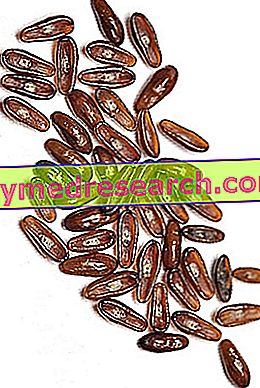Agar : it is used for the formulation of thickening products, capable of determining a particular consistency; it is found in volume laxative preparations and in adjuvants in low-calorie diets.
Psyllium : it is a drug derived from a plant called Plantago psyllium, belonging to the Plantaginaceae family. It is a very common plant, cultivated in the Middle East to produce a drug consisting of seeds.

Psyllium seeds
Psyllium seeds are extremely small, with a maximum volume of 1-2 mm, a brown-blackish color and a shiny surface. It is precisely this surface that is covered with mucilages, which are extracted by placing the seeds inside large tanks containing hot water. The mucilages, thus, detach and enter into solution, forming a superficial colloidal layer. Detaching from the used part of the seed, they are then harvested and dried; therefore, they become psyllium powder or plant dust, as it is marketed in its raw state. The uses of this powder are analogous to all the mucilages, in particular in the medicinal-technical use as excipients. An important characteristic of the mucilages is precisely that of adsorbing water, but also of retaining it, so it is evident that a topical mucilaginous product has the property of releasing water slowly, hydrating the skin, with a protective effect on the skin itself and mucous.
As for the mucous membrane of the mouth, the products for oral hygiene are rich in mucilage, because they boast excellent soothing properties, in particular those of mallow. Mucilages also have protective virtues; in fact they form a sort of barrier between the environment and the inflamed mucosa, favoring the recovery of a normal functionality and attenuating the phlogistic state.



